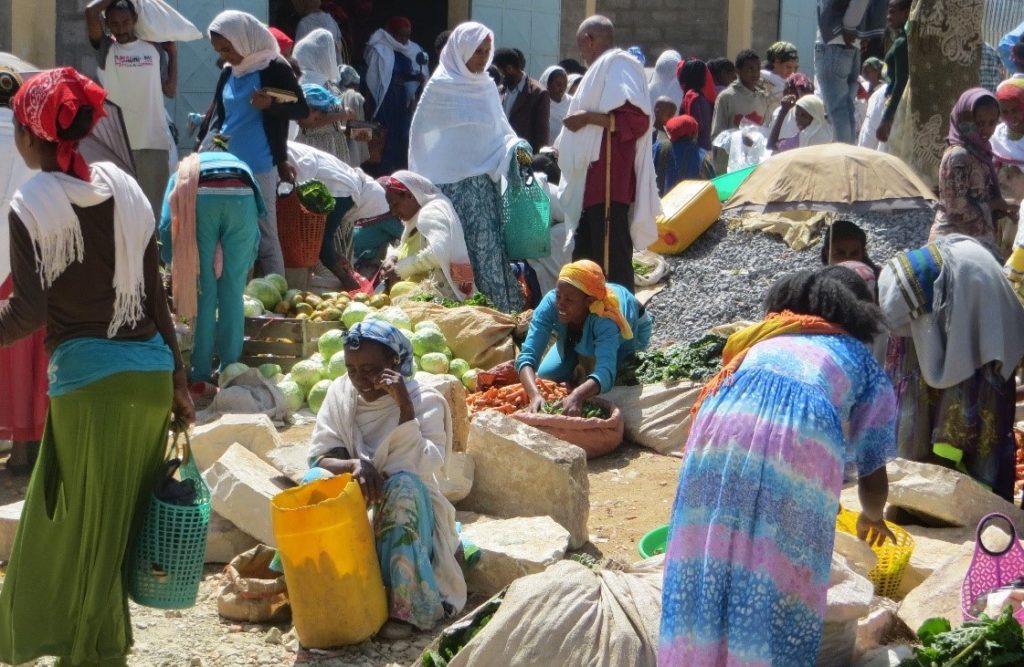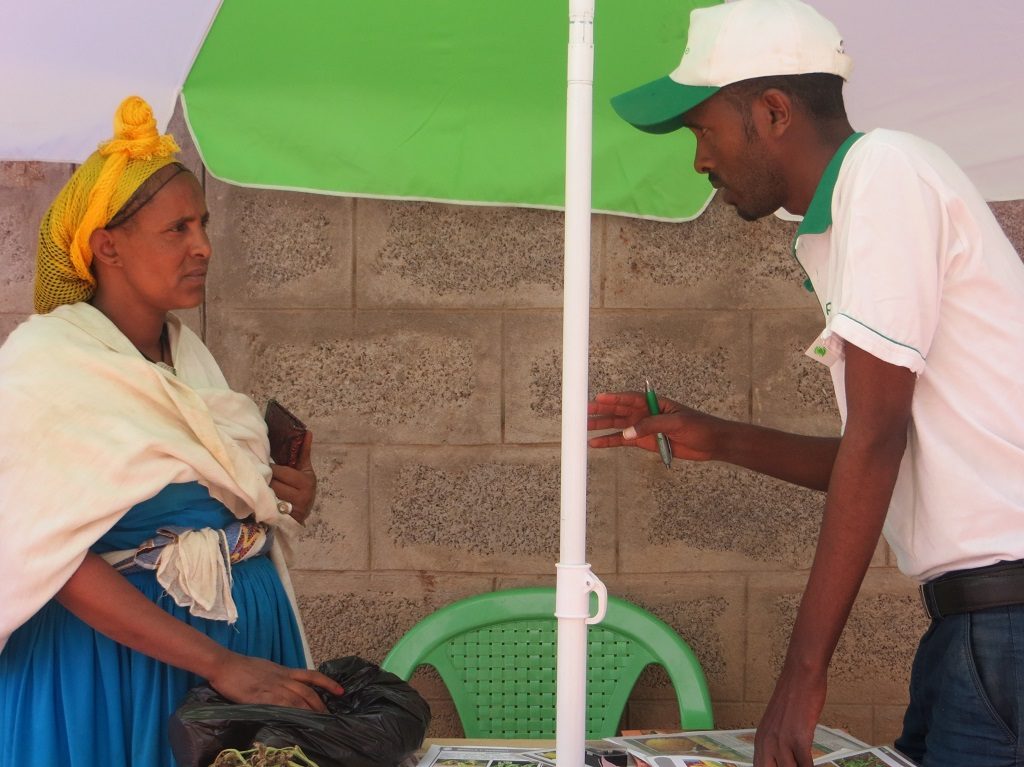
A study conducted in 2016 revealed a significant increase in use of chemical pesticides in Ethiopia over the last decade, showing that the attitudes, knowledge and practices of farmers and farm workers regarding safe use of pesticides are poor. Similarly, another study from 2015 shows that farmers apply pesticides in violation of the manufacturers’ recommendations; by using unsafe storage facilities, ignoring risks and safety instructions, failing to use protective devices when applying pesticides, and unsafely disposing of empty containers. Such practices have adverse economic, environmental and health impacts.
These are the same experiences of plant doctors and farmers from Raya Azebo district of Ethiopia’s Tigray region. Found in Northern Ethiopia, Raya Azebo is about 650 km from Addis Ababa. Plantwise was first piloted in Raya Azebo district in 2014, with the launch of two plant clinics. The area has good potential for agricultural production of a variety of crops under rain-fed production and irrigation.
Irrigation schemes are common in the area resulting in intensive farming activities and the district is one of the highest producers of sorghum, teff, tomato, onion, and pepper. In Raya Azebo, one of the pilot community-based plant clinics operates in Wargiba village. Through irrigation, the village enjoys year-round production of high value crops meaning that farmers tend to rely on pesticides to save their crops from the increasing infestation of pests.
Before the plant clinic was launched in the village, there were rampant cases of misuse of pesticides including; unscrupulous agro-dealers selling counterfeit products to farmers, re-packing and mixing pesticides, farmers using unregistered pesticides, heavy pesticide application practices above the recommended rates, ignorance of the appropriate time of the day to apply pesticides and no consideration for the negative effects on human health and the environment.
“Some agro-dealers used to sell insecticides to farmers to treat fungal diseases on crops, and at other times provide fungicides for insect pest problems. In fact, some agro-dealers were knowingly selling expired products, while at times they could misadvise farmers to use excessive amounts of pesticides in several rounds of spraying, largely driven by profit,” observed Mrs. Alemash Neguse, district crop protection expert.
However, launching a plant clinic in the area has had a positive effect on pesticides supply, use, and handling. Through numerous efforts and initiatives, the district agriculture officers and plant doctors engaged closely with pesticide dealers, providing them with technical information on the latest registered pesticides. They also negotiated and reached a consensus on the mode of sale of pesticides to farmers.
Now, agro-dealers mostly sell pesticides to farmers based on a prescription provided by the plant doctor. Before selling any pesticides, agro-dealers now advise farmers to first consult a plant doctor for advice and obtain a prescription for the appropriate product to use. This was a mutually-agreed-upon step by the district agriculture experts, plant doctors and the agro-dealers. So now, not only have agro-dealers started to supply registered pesticides of the right type and quality, but now under watch by the authorities, opportunistic business behaviour has minimized.
Furthermore, suppliers of agro-inputs display the lists of their products along with products prices at accessible locations such as farmers’ training centres. This is one aspect where the plant doctors and agricultural experts have achieved tangible strong linkages between plant clinics and agro-dealers.
With Plantwise, both the agriculture experts and agro-dealers are now moving towards making all pesticides supply in the district prescription-based. Experiences from other countries also show that agro-dealers can improve their operations and contributions if they are effectively engaged and brought on-board.

Farmers too have changed their pesticides handling practices; they avoid mixing chemicals, they use the right type of pesticides, application rate and at the right time. They uphold environmental safety and are aware about the dangers of resistance development, and the majority have learned how to safely dispose of empty chemical containers and use personal protection equipment.
After witnessing some of the recent changes, Mr Hayelom Ale, a farmer from Wargiba village, said, “I used to carelessly dispose of my empty pesticide containers in my field. But since knowledge we have gained from the plant doctor, I have started taking the empty pesticide containers out of our farm, digging deep hole away from water sources and safely burying them.”
Another farmer from Wargiba village, Mr Hagos Bata, commented that, “After the advice of the plant doctor, we are now more aware of proper and safe application and use of pesticides, the right time to apply, and the importance of using proper personal protection equipment when spraying.”
Farmers also said that a lack of knowledge in correctly diagnosing and identifying plant health problems was a major challenge before the launch of the plant clinics, that has now been solved.
“Before Plantwise, we were having serious problems in getting a proper diagnosis and identifying of our crop problems, which meant we used to rely heavily on the best guess and suggestions of agro-dealers, who would often operate without integrity and sound business ethics,” reported Mr Haile Hafitu. “But, with plant doctors, we get our crop problems properly diagnosed and then go to the agro-dealers with a prescription for the appropriate solution. This helps us to save our money and our crops.”
These experiences from Raya Azebo demonstrate the real strength in cultivating partnerships on the ground. By forming amiable working relationships and strong linkages with agro-dealers, plant doctors were able to create desirable changes to behaviour and business practices.
Read more
Education on safe pesticide use crucial for farmers in rural Kenya
Registration of red list chemicals halted in Pakistan thanks to Plantwise
Related News & Blogs
Post-registration pesticide reviews: Experiences, learnings and best practices
CABI’s PlantwisePlus programme recently hosted a webinar to raise awareness and potential solutions to the challenges around post-registration pesticide reviews – a vital stage in the review process that helps ensure compliance with safety regulations…
9 July 2025




